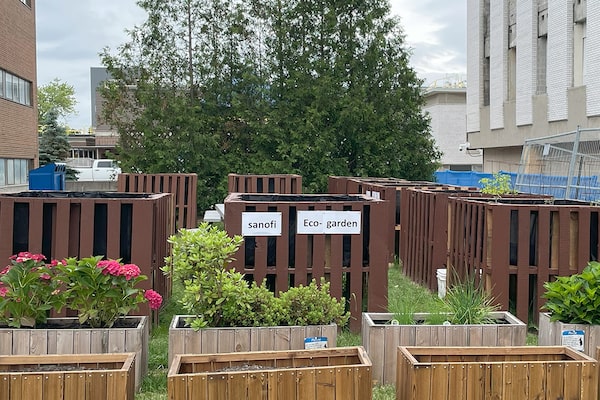
An employee eco-garden at Sanofi Canada.Provided
For Matthieu Puyet, it makes perfect sense that Sanofi Canada, which operates one of the largest vaccine research and development and manufacturing facilities in the world, has an overarching commitment to a sustainable and resilient future.
“It’s in our DNA,” he says. “We’re a health-care company dedicated to improving people’s lives and that includes caring for the planet.”
Puyet is head of manufacturing and supply for Canada as well as Toronto site head. That gives him a key role in managing the environmental impact of Sanofi Canada’s 54-acre campus in north Toronto.
In addition to state-of-the-art manufacturing facilities that produce vaccines, the campus also hosts commercial and support function teams. Puyet, his team and all Sanofi Canada employees on site are engaged in a wide range of initiatives to protect the planet.
“People are stepping up,” says Melanee Short, head of sustainability, global engineering. “They’re passionate about finding new ways of doing things that help mitigate our environmental footprint.”
A global biopharmaceutical and health-care company with operations in over 100 countries, Paris-based Sanofi is committed to being carbon neutral by 2030 and to net-zero emissions by 2045.
Short works with manufacturing and supply teams around the world to meet those and other objectives set out in Planet Care, Sanofi’s global environmental sustainability strategy.
“I help turn goals into action plans,” she says. That includes at her home base in Toronto where there’s a focus on water and energy management.
Many measures, including switching over to more energy-efficient LED lighting, have already been implemented. But cutting back on heating, cooling and ventilation could be a challenge as many of the manufacturing facilities need to be kept within precise temperature ranges.
Help is on the way with $176-million being invested in infrastructure related to Sanofi Canada’s environmental initiatives. That’s in addition to over $2-billion in new infrastructure investments it is on track to deliver by 2028 to enhance its vaccine capabilities.
“I’m so proud,” says Puyet. “It’s very rare for one site to receive more than $170-million to drive decarbonization and reduction in water consumption. Our global headquarters believes we are the right site with the right strategy.”
This includes ambitious plans to reduce water and energy consumption. By September 2024, Sanofi Canada will begin to reuse 20 per cent of its wastewater thanks to its on-site water treatment processes. Furthermore, the energy master plan for the campus includes a commitment to reduce carbon emissions by 15,000 tonnes per year by 2026.
The commitment to environmental sustainability goes beyond infrastructure and operations. Like other Sanofi sites around the world, Sanofi Canada is sponsoring offsite beehives to promote bees and other pollinators. The honey collected is sold to employees with all proceeds donated to charity.
Sanofi Canada employees also joined other teams of volunteers to spend a day pulling out invasive plants from a ravine that’s part of a city park adjacent to the Toronto campus. They ended up with more than weeds; they also removed bags of garbage and abandoned bicycles.
Mobilizing employees and empowering them to do more to protect the planet is another of Sanofi’s key objectives. Short says that sort of engagement also contributes to employees’ job satisfaction.
“People all want to feel that they’re doing the right thing,” she says, adding that having an environmentally conscious culture in the workplace is particularly important to younger employees. “For them it’s an expectation, not a ‘nice to have.’”
More from Canada’s Greenest Employers
Advertising feature produced by Canada’s Top 100 Employers, a division of Mediacorp Canada Inc. The Globe and Mail’s editorial department was not involved.